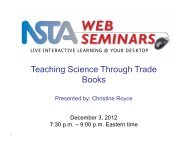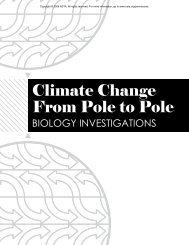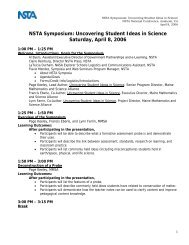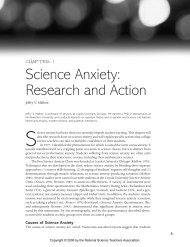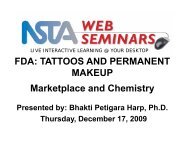Copyright © 2008 NSTA. All rights reserved. For more information ...
Copyright © 2008 NSTA. All rights reserved. For more information ...
Copyright © 2008 NSTA. All rights reserved. For more information ...
Create successful ePaper yourself
Turn your PDF publications into a flip-book with our unique Google optimized e-Paper software.
18<br />
<strong>Copyright</strong> <strong>©</strong> <strong>2008</strong> <strong>NSTA</strong>. <strong>All</strong> <strong>rights</strong> <strong>reserved</strong>. <strong>For</strong> <strong>more</strong> <strong>information</strong>, go to www.nsta.org/permissions.<br />
Section 1 The Nature of Science and Science Inquiry<br />
during their discussions. Finally, when<br />
all other groups are running smoothly,<br />
it is a great idea to join a literature circle<br />
as a group member. This participation<br />
has two key benefits. It will allow you to<br />
demonstrate for your students techniques<br />
for productive, respectful, and inclusive<br />
discussion and, most important, it will allow<br />
your students to see an adult’s genuine<br />
enthusiasm for reading about the history<br />
of science.<br />
William Straits is an assistant professor in the Department of<br />
Science Education at California State University, Long Beach,<br />
in Long Beach, California.<br />
References<br />
Daniels, h. 1994. Literature circles: Voice and choice<br />
in book clubs and reading groups. Portland, Me:<br />
Stenhouse Publishers.<br />
National Research council (NRc). 1996. National<br />
Science Education Standards. Washington,<br />
Dc: National Academy Press.<br />
Rosenblatt, L. M. 1978. The reader, the text, the<br />
poem: The transactional theory of literary work.<br />
carbondale, IL: Southern Illinois University<br />
Press.<br />
Straits, W. 2005. Pre-service teachers’ representations<br />
of their developing nature of<br />
science understandings. Paper presented<br />
at the Qualitative Interest Group (QUIG)<br />
conference on Interdisciplinary Qualitative<br />
Studies, Athens, GA.<br />
Straits, W. 2007. Using historical non-fiction<br />
and literature circles to develop elementary<br />
teachers’ nature of science understandings.<br />
Journal of Science Teacher Education 18 (6).<br />
NATIoNAL ScIeNce TeAcheRS ASSocIATIoN



